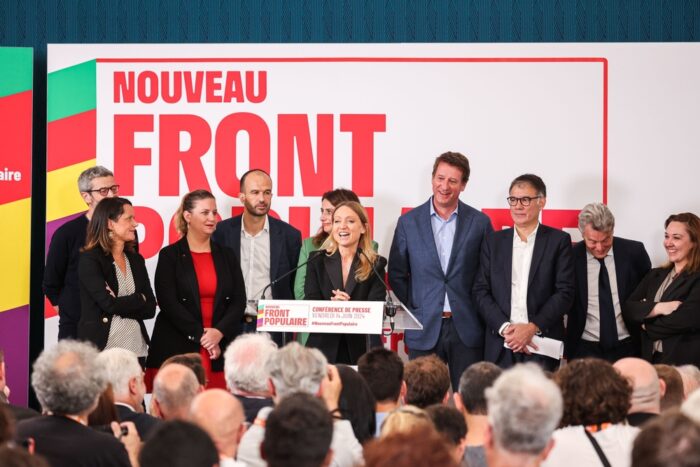The Progressive Post
The UK election – a turning point on Europe?

While Labour fought a campaign that was cautious on policy commitments of any kind, it did signal a new approach to relations with the EU. The realities of government may take it even further.
The Labour party won a very large majority in terms of seats (412 out of the 650 in the House of Commons) while winning just 34 per cent of the votes. How? Britain’s electoral system (plurality in single-member constituencies) always produces a disproportionately large number of seats for parties with the most votes, but this time it was particularly acute because of the huge collapse of the Conservatives’ share of the vote (to just 24 per cent, giving them 121 seats) as well as by the unusually large number of votes going to smaller parties – the Liberal Democrats, Reform UK (REFUK – the successor party to UKIP), the Greens and a number of independents standing on a pro-Gaza platform. Of these, only the centrist Liberal Democrats gained a significant number of seats (72). And where they did, it was in part because of Labour supporters ‘lending’ them their vote in constituencies where they had the better chance of defeating the Conservative candidate. However, in the context of the rise of far-right parties across Europe, it was notable that Reform UK (REFUK) got 14 per cent of the vote (though only 5 seats). In Scotland, the independentist SNP collapsed to just nine seats.
Back in 2019, the Conservatives had won a clear majority of seats with 43 per cent of the vote – while 53 per cent had voted for the various parties that demanded a new referendum which could have stopped Brexit. This time, some 60 per cent voted for those parties, and over four fifths of the new House of Commons consists of MPs who had opposed Brexit in the 2016 referendum. In this new parliament, the natural pre-disposition of most MPs towards Europe is positive.
But that does not mean that Britain’s application to re-join the EU will be in the post any time soon. In the election campaign, Brexit was the elephant in the room. The Conservatives did dare not mention it because public opinion is now firmly of the opinion that Brexit was a mistake with them to blame (with some polls indicating that over 60 per cent would vote to rejoin if a referendum were held now). Labour did not mention it (much) because it was still afraid of losing votes in some traditionally Labour areas that had supported Brexit. Labour made no commitment to rejoining the EU and said that it had no plans to join the customs union or the single market.
What Labour did say in its manifesto was that it will seek ‘an improved and ambitious relationship with our European partners’. Specifically, it can be discerned from the manifesto and various policy statements that this would include several things. The Labour government will seek to:
- Reduce barriers to trade between the UK and the EU caused by the shortcomings in the Trade and Cooperation Agreement negotiated by Boris Johnson. This would involve, inter alia, a veterinary agreement, mutual recognition of professional qualifications, visa exemptions for touring performers (notably musicians and actors) and regulatory alignments.
- Rejoin some of the EU’s decentralised agencies (at least as observer or associate members), such as Europol.
- Negotiate a security agreement with the EU. This may turn out to be of great significance in view of the situation in Ukraine and especially if Trump is reelected in the USA. It would include security in the widest sense of the term – not just military cooperation but sanctions, cybersecurity counterterrorism, fighting traffickers, combatting climate change and more.
- Build on the still shared commitment to achieve net zero emissions by 2050 to cooperate on climate and energy questions (presumably including cross-border energy interconnectors and the carbon border adjustment mechanisms).
But the realities of government may force Labour to go further and faster. The biggest challenge it will face in government is the catastrophic state of public finances. With both debt and taxes at levels not seen since the 1940s, the election campaign was characterised by debates on whether it might be possible to spend or save an extra £3 billion here or £4 billion there. These figures are dwarfed by the £40 billion a year of lost tax revenue which has been caused by Brexit (according to the government’s Office of Budgetary Responsibility). Similarly, if the Labour government is to re-kindle economic growth, it cannot ignore the 5 per cent loss to GDP, the lost trade and the extra costs on businesses caused by Brexit.
In this context, the over-cautious red lines mentioned by Labour in the election campaign – no to joining the customs union, no to full single market membership and no to freedom of movement – will limit the potential improvements. There will be costly border checks as long as there is a customs border. Without aligning with single market rules and standards, there will be no return to the frictionless trade that existed pre-Brexit. Without some free movement, there will be little prospect for improving service trade (even for touring performers and musicians).
If reality forces the Labour government to go further, it will find that this is popular. The silence on Brexit in the election campaign avoided it becoming a high-focus partisan issue between the two main parties, which might have entrenched existing attitudes. Instead, the silence on this issue may have made it easier for public opinion to continue its relentless shift in favour of rejoining the EU. If so, smaller steps should certainly be easier.
Photo credits: Shutterstock.com/Multishooter




